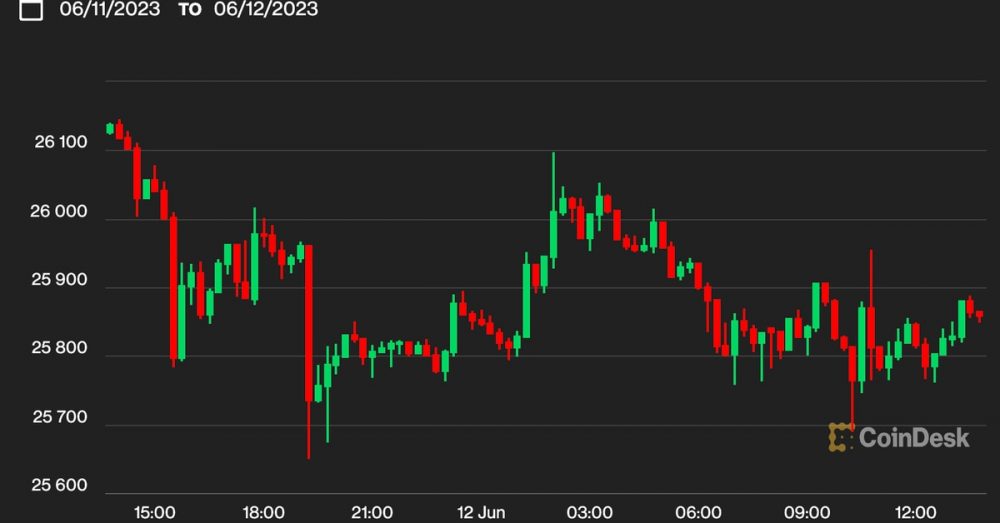After surfacing briefly above $26,000 early Monday morning, bitcoin returned to its recent, more familiar haunts below this threshold.
The largest cryptocurrency by market capitalization was recently trading at $25,850, down a percentage point over the past 24 hours. BTC dipped $26,000 near the end of last week, which offered a troubling mix of Security and Exchange (SEC) lawsuits against crypto exchange giants Binance and Coinbase and ongoing angst about U.S. central bank, inflation-fighting monetary policy. Investors will now be eyeing the release of the May Consumer Price Index (CPI) on Tuesday and the Federal Reserve’s interest rate decision a day later.
“The Cryptoverse is stuck in limbo as regulatory fears run wild and as some investors abandon certain key exchanges,” said Edward Moya, senior market analyst at foreign exchange market maker Oanda, wrote in an email. “Mainstream acceptance for crypto won’t occur with DeFi. While experienced crypto traders move more their trading volumes onto DeFi, this is not good news for long-term growth and for attracting new investors.”
Moya noted that ahead of the CPI report and Fed decision, “bitcoin has key support at the $25,400 region.”
Ether was recently changing hands at about $1,735, off 1.8% from Sunday, same time, swept up in a larger market downturn that saw major tokens mentioned in the SEC suits. SOL, the token of the Solana blockchain, recently plunged nearly 7%, while MATIC and ADA, the native cryptos of the Polygon and Cardana smart contracts platforms fell about 2.8% and 1.5%, respectively. Meanwhile, the CoinDesk Ethereum Trend Indicator ticked into downtrend territory a week after rising into the significant upturn category – the fall-off a sign of sagging investor sentiment.
Cryptos’ path again veered from major U.S. equity indexes, which rose – buoyed by a recent surge in large tech stocks. The S&P 500, which has a large technology component, climbed 0.9% to reach its highest level in a year. The tech-heavy Nasdaq and Dow Jones Industrial Average (DJIA) jumped 1.5% and 0.5%, respectively. The yield on the 10-year Treasury ticked up to 3.73%. Gold, which has often traded similarly to digital assets as a safe haven asset, fell 0.2%.
In a Telegram message to CoinDesk, Strahinja Savic, head of data and analytics at Toronto-based crypto platform FRNT Financial, noted that the coins “caught up in last week’s SEC actions are underperforming. But he added optimistically that in 2020, Ripple’s XRP token lost significant ground before rallying strongly months later.
“(The) XRP market cap now is roughly where it was just before the SEC sued Ripple,” Savic wrote. “We’ll see if the assets named in the SEC’s lawsuits will show similar resilience amid the regulatory complexity coming from these (Binanc, Coinbase) cases.”







